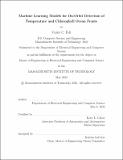Machine Learning Models for On-Orbit Detection of Temperature and Chlorophyll Ocean Fronts
Author(s)
Felt, Violet C.
DownloadThesis PDF (20.06Mb)
Advisor
Cahoy, Kerri L.
Terms of use
Metadata
Show full item recordAbstract
Small-scale ocean fronts play a significant role in absorbing the excess heat and CO2 generated by climate change, yet their dynamics are not well understood. Existing in-situ and remote sensing measurements of the ocean are of inadequate spatial and temporal coverage to globally map small-scale ocean fronts, and existing algorithms to generate ocean front maps are computationally intensive. We propose machine learning (ML) models to detect temperature and chlorophyll ocean fronts from unprocessed satellite imagery, significantly reducing the standard resources and computational times needed for detecting ocean fronts. These models are developed with resource-constrained satellite imaging platforms like CubeSats in mind, as such platforms are able to address the spatial and temporal coverage challenges. The highest performing models achieve accuracies of 96% and make predictions in milliseconds using less than 100 MB of storage; these capabilities are well-suited for CubeSat deployment.
Date issued
2022-05Department
Massachusetts Institute of Technology. Department of Electrical Engineering and Computer SciencePublisher
Massachusetts Institute of Technology